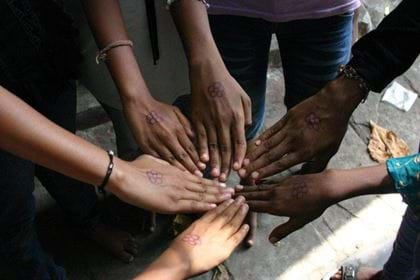Protecting children: The story of Rahul and Arjun

Rahul was 10 years old when his parents sold him for Rs.1,500 (c. £17) to a nomadic sheep herder.
His parents, agricultural workers from a tribe in Madhya Pradesh, India, have nine other children. Families from their very poor community are routinely forced to sell their young children into unpaid, coerced labour in order to survive.
Rahul’s ‘owner’ treated him badly. He worked very long hours and was only allowed to sleep for up to five hours a day, had little to eat, was regularly beaten and often sexually abused. One day, Rahul took his chance and ran away.
He was one of the lucky ones. Rahul was found and taken to a shelter run by our local partner organisation. When he arrived, he was emaciated; his clothes were worn out and his hair was full of lice.
The team at the shelter was immediately able to provide counselling and soon encouraged Rahul to study and to express himself. Rahul has blossomed and now also enthusiastically takes part in dancing, painting and craft activities. Through the support of the British Asian Trust, he has been able to experience something of childhood for the first time in his life.
Three months after Rahul came to the shelter, an eight-year-old boy arrived with a similar story. He turned out to be Rahul’s younger brother Arjun. The boys’ parents had sold him as well, for just Rs1,000 (c. £11). Arjun also revealed to the team that six other boys from the community were sold at the same time. Like Rahul, Arjun at least had managed to escape his owner and seek help.
Our partner tried to contact Rahul and Arjun’s parents, but requests for a reunion were turned down until, finally, the team turned to the police. The horrific practice of selling children in Madhya Pradesh was brought to the attention of the authorities and also to the media. Shockingly, several reports were discovered of other children who had been sold and subsequently died.
Eventually, the desperation driving parents to sell their children was exposed and the head of the community began the vital process of registering people for both voter ID and Below Poverty Line ration cards.
The potential for an improvement in their financial situation changed everything for Rahul and Arjun’s parents. At last the family was reunited. Both children are now enrolled in school and are pursuing their education.
Our anti-trafficking work in India is crucial. According to The Global Slavery Index and the National Crime Records Bureau, there were 15,379 people trafficked in India in 2016, of whom 9,034 were children.
The British Asian Trust runs its Anti-trafficking Programme to protect victims of human trafficking from forced labour and sexual exploitation by working with businesses to lower the demand for child labour and encourage them to choose non-exploitative labour. We do so in partnership with local organisations such as Childline India and Taabar, and with funding from the John Lewis Foundation.
Names have been changed.
